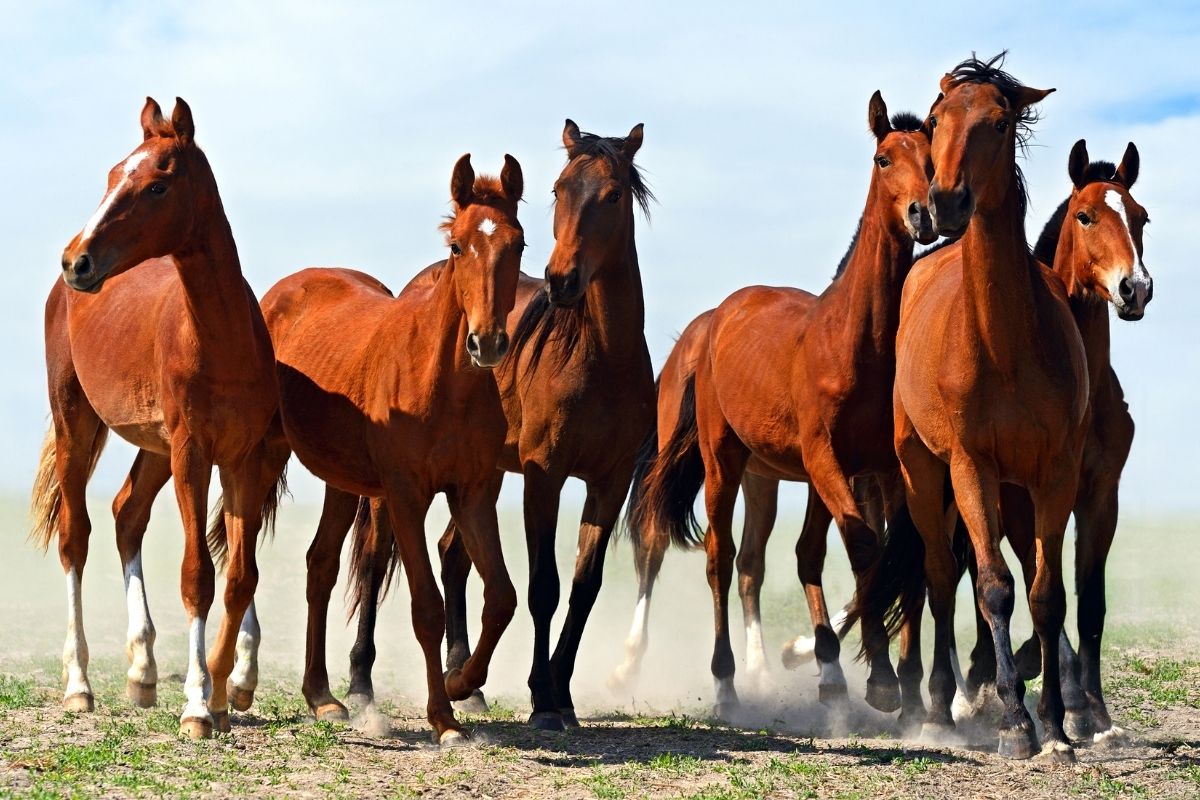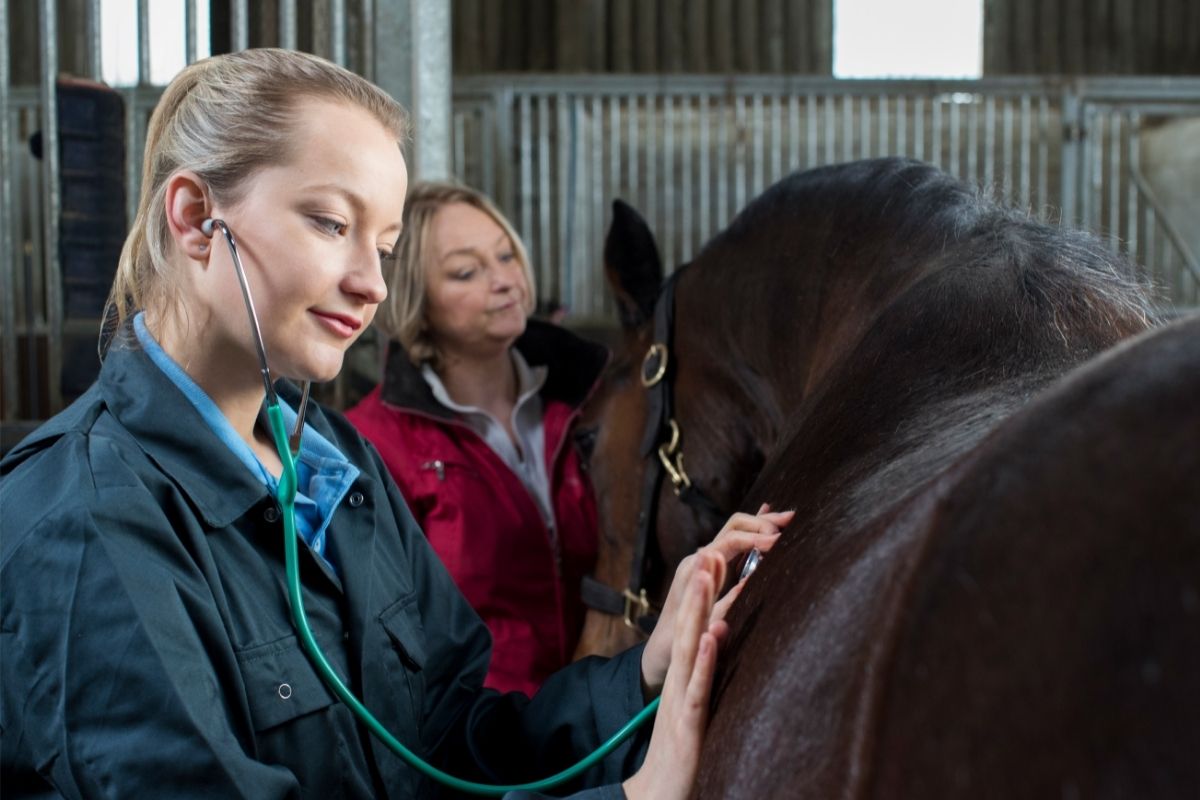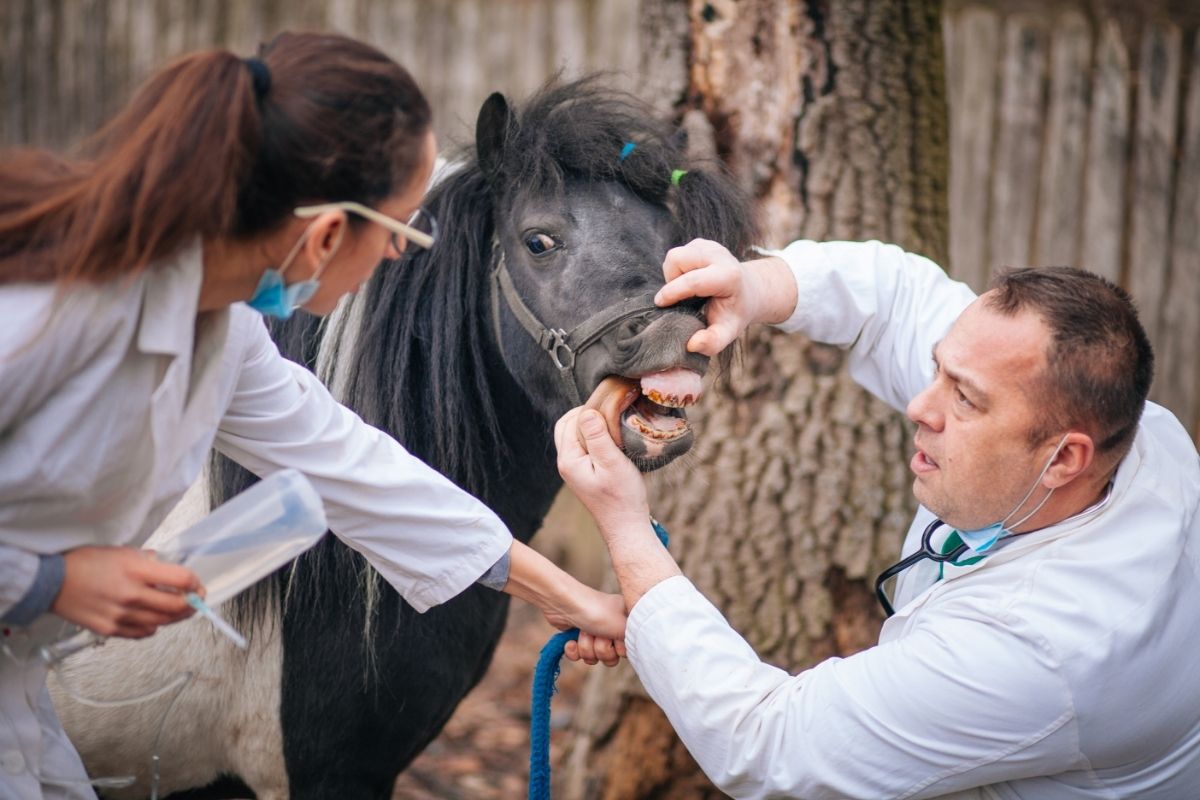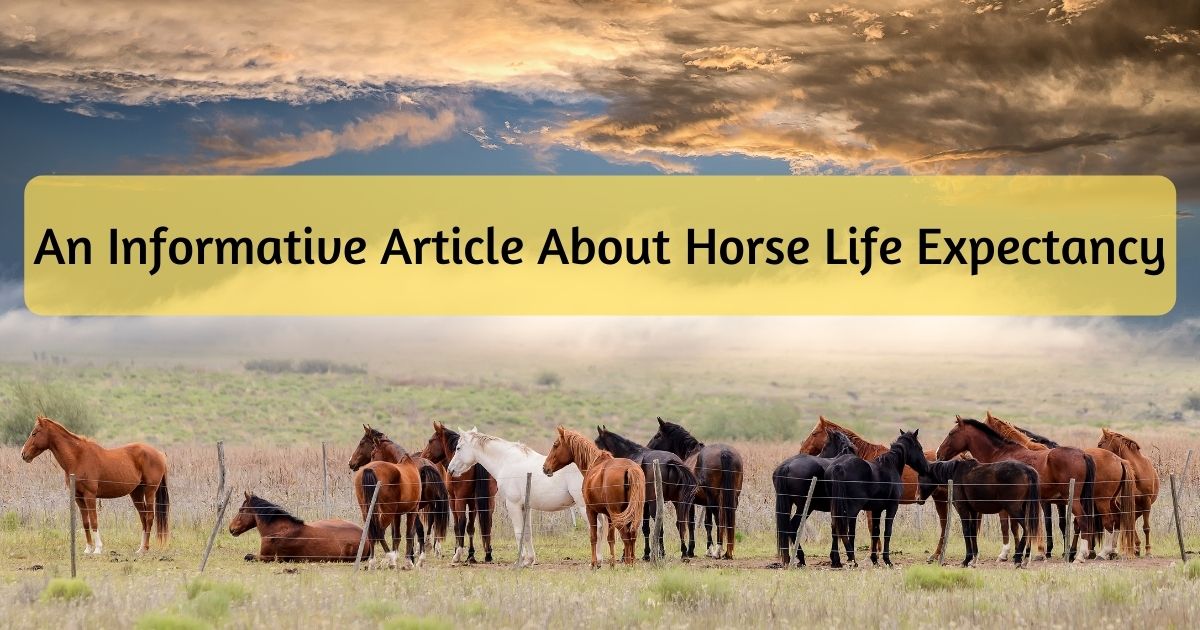Where Did Horses Originate?
The average horse life expectancy is 25 years old, but now it’s closer to 45! This is because horses receive good treatment and care today, unlike previous years. But where did horses originate?
For over 50 million years, horses have roamed the North American continent. First, they were small animals that lived in forests and grassy plains. Then, they gradually increased in size to become what we know as trusty equines today.
These original wild horses spread their descendants across Asia, Europe, and then worldwide, where people found new ways to use them as transportation devices.

Factors That Affect Horse Life Expectancy
The average life expectancy of a horse is 25 to 30 years. However, there are some cases where they live up into their 50s or even 60s! It should be noted that there are factors that will contribute to the longevity of a horse. Below are some of the elements:
Nutrition
Horses need a diet of fresh hay or grass to stay healthy. In addition, they should have small meals throughout the day to not get too hungry. A lot of hunger can lead to ulcers, which can take weeks before manifesting any symptoms.
If you want your horse to be happy, get some hay and water. This should be constant so that they have them whenever they are peckish. You should also include grains in your horse’s diet. However, feed them sparingly, as too much can lead to joint problems. Grains offer energy for those long rides with little effect on weight.
If you’re going on a long trip with your horse, ensure they have enough food from their usual diet before traveling. Changing foods quickly causes digestive problems like nausea and diarrhea. Try making adjustments gradually.
Veterinary Care
Your horse is a living creature that needs the same care and attention as any other pet. It’s essential to keep them healthy, which means you should visit your veterinarian regularly.
Vaccinations for horses can be used to prevent them from getting sick. They also help to increase horse years. Vaccines will depend on the horse’s age and where you live.
One of the key ways to lower your horse’s risk for internal parasites is regularly removing manure. You can also ask for veterinary help with deworming medicines, significantly reducing infestation from worms.
Your horse needs to have its teeth checked and filed by a vet at least once or twice per year. If they develop uneven wear, this could lead to your equine friend eating problems as well! Have them visit a vet for professional dental care.
Horse Housing
Horses need a clean place to call their own. They’re not just pets; they belong in the barn with you! A three-sided shelter will provide them security from rain, storm, heatstroke, or even insects.
A barn is a dirty place. The horses produce manure that you must remove daily. Otherwise, it would build up and create an infestation of flies or other insects.
To add on housing, you should make sure your horse is well-hydrated. If it’s hot out, provide them with water and minerals like salt licks to prevent dehydration. When winter comes around, put on a waterproof blanket to stay protected from any wetness or cold conditions!
Exercise
All horses need regular exercise. They should be taken for a ride and allowed to walk around in their pasture. Ensure that there is no barbed wire on the fence of this area as it can cause injury from cuts or scratches from fencing materials. Please do not keep them inside all day unless recommended by your vet because it’s unhealthy for horse bones.
Hoof Care
A horse with healthy hooves is a happy horse. However, hoof problems can stop them from exercising and leading an active lifestyle. Trimming should be done at least once every month to keep your equine friend’s feet looking their best. This includes putting horseshoes on them.
The Importance of Equine Vaccines
Have you ever stopped to consider why we vaccinate our horses? Vaccines are meant for protection. They create immunity against specific diseases so that an animal has a reduced risk of getting sick if infected. Additionally, these vaccinations might help reduce severity in case there is any contagiousness involved.
Horses need to get vaccines. Below are some of the most important vaccines for horses:
Tetanus
Tetanus is a disease caused by the spore of bacteria and can lead to death in some cases. In addition, the tetanospores found in soil can produce a neurotoxin, which leads to permanent injury or paralysis if mishandled; even minor cuts could make this happen, so annual vaccinations should be completed for best results.
Equine Influenza
Equine Influenza is a highly contagious viral disease that spreads through the air, clothing, or equipment used by infected horses. It causes dry coughing and fever with other symptoms, including watery nasal discharge and even loss of appetite for food. Although it’s uncommon to die from this condition alone, your horse might also experience an array of illnesses that may lead to death.
Strangles
Strangles is a highly infectious disease that can be introduced to horses through the grooming of any carrier animals. If it’s not caught in time, strangles will cause an upper respiratory tract infection and abscesses around the throat area.
These infections may lead to severe cases like pneumonia. Unfortunately, Strangles has no cure, but yearly vaccinations cost less than what could cost you to treat the disease itself.
Hendra Virus
The Hendra Virus is a rampant and fast-moving disease that can cause death within days of exposure. In addition, if not vaccinated, the horse will suffer from respiratory problems, colic, or neurological symptoms such as convulsions. Therefore, vaccinations are usually administered in six-month intervals.
Equine Herpes
Equine Herpes is an infection that affects horses’ respiratory, reproductive, and neurological systems. EHV 1 and 4 can cause paralysis in some cases to hinder movement on their hind limbs.
It also affects other bodily functions like breathing or fertility (in females). Neurological Equine Herpes has not been studied extensively but poses a greater risk. However, vaccines exist which protect against this strain too!
Contact your vet about the vaccinations you should get for your horse before it becomes ill. Vaccination recommendations can vary depending on where in the world they live. This could be because different areas have varying immunity levels against certain diseases.

How Many Species of Horses are There?
There are about 400 different breeds of horses worldwide. However, only one species is the Domestic Horse, which is also called Equus Caballus. The reason why we can find so many variations among this single kind lies in genetics, which determines traits each individual carries over time.
What Age is the Oldest Horse?
A horse can live up to 25 years of age, though many live much longer. Unfortunately, it’s not easy for researchers or owners alike to pinpoint the oldest horse ever in history.
Many pure or part-bred horses have registration papers that record their birth. Unfortunately, throughout their lifetime, these records can get lost. Permanent identification makes it less likely for this to happen. Fortunately, there are options like passports and other identifying paperwork that will help to determine the age.
How to Tell if Your Horse is Aging
With improved equine veterinary and dental care available in modern times, more horses are reaching senior years than ever before. However, some breeds have a higher lifespan expectancy than others.
Aging is a natural process that you cannot stop. The signs of age can affect any system in your horse’s body, like their digestive health and immune system. However, it usually shows dry eyes or thinning hairs with advanced stages displaying symptoms such as bone problems.
The average onset timetable may vary depending on where you live. Still, some horses start showing visible changes around the ages of 15-20, while others maintain youthfulness until they are well into their twenties!
Below are some signs of aging in horses:
- Lameness
- Loss of muscle mass
- Prominent withers
- Rough coat
- Sunken eyes
- Swayed back
- Diminished eyesight
- Drooping fetlocks
- Droopy lips
- Grey hair
How Old is my Horse in Human Years?
How old are you in horse years? Have you ever wondered how that relates to your age and what it means to you and the horse? Unfortunately, there’s no straightforward answer because horses mature at such different rates from humans, meaning all calculations should be taken with caution!
One year horse age is equivalent to 6.5 years old in humans, as shown below:
- 1 Horse Year = 6.5 Human Years
- 2 Horse Years = 13 Human Years
- 3 Horse Years = 19.5 Human Years
- 4 Horse Years = 20 Human Years
- 5 Horse Years = 23.5 Human Years
- 6 Horse Years = 27 Human Years
- 7 Horse Years = 30.5 Human Years
- 8 Horse Years = 31 Human Years
- 9 Horse Years = 34 Human Years
- 10 Horse Years = 37 Human Years
- 11 Horse Years = 40 Human Years
- 12 Horse Years = 43 Human Years
- 13 Horse Years = 46 Human Years
- 14 Horse Years = 49 Human Years
- 15 Horse Years = 52 Human Years
- 16 Horse Years = 55 Human Years
- 17 Horse Years = 58 Human Years
- 18 Horse Years = 61 Human Years
- 19 Horse Years = 64 Human Years
- 20 Horse Years = 67 Human Years
- 21 Horse Years = 70 Human Years
Telling a Horse’s Age by Looking at Its Teeth
Telling a horse’s age by looking at its teeth might seem like an easy way to do it, but this isn’t entirely true. Horse tooth growth patterns aren’t as simple and predictable as tree rings which indicate years of development.
Instead, different horses will vary each year, depending on their eating habits. Unfortunately, this means guessing based on physical characteristics alone gives inaccurate results.
How the horse’s teeth age is affected by many factors. These include essential maintenance, diet, and grazing conditions. So it can be challenging to estimate an exact lifespan.

5 Horse Breeds That Live the Longest
How old do horses live? Typically, today’s domesticated horse lives an average of 25-30 years. Here are some of the longest-living horse breeds:
Arabians
Arabians live an average of 25-30 years. A Polish Arabian mare named Magic is the oldest documented horse in history. She lived to be 46 years old. However, there have been cases where Arabians reach up to 40 or even 50!
The Arabian horse is one of the oldest breeds globally, dating back 4500 years. These horses can be found across the globe and are among the top 10 most popular breeds globally today. They’re known for their versatility as well as endurance – having quick learning abilities with high spirits that make them willing partners!
Appaloosa
The Appaloosa is a unique horse that comes from the Nez Perce people. They are known for their spotted coat pattern, which was developed by strict breeding practices. The Appaloosa is a versatile breed that can be successful in different disciplines.
This state horse of Idaho has been classified as having both stock and sporting horses thanks to its cross-breeding with Thoroughbreds, Quarter Horses, and Arabians. They live for approximately 30 years.
Icelandic Horses
The Icelandic horse is from a volcanic island called Iceland. The Vikings brought these wild horses, and they served as their sole means of transportation until cars got invented. They didn’t have much luck with that because it was hard out there!
Natural selection helped shape this breed’s evolution in harsh conditions like those found on islands. Some Icelandic horses have lived up to 40 years of age, but the average lifespan of a horse of this kind is 25-30.
Quarter Horses
The American Quarter Horse is the most versatile in America. It can excel at about any discipline you could think of, and it got its name because it has an average speed that surpasses even other speedy breeds like Thoroughbreds or other Quarter Horse breeds!
The life expectancy of your Quarter Horse depends on genetics, nutrition, and workload. It usually ranges from 10 to 15 years old in the wild, but these animals can live up to 25 -35 years or more when handled well.
Haflingers
The Haflinger is considered a draft breed but smaller than most other breeds. The horse’s name originates from Austria and northern Italy, where it was bred to be kind and quiet. The World Haflinger Foundation manages these horses with a strict inspection system to maintain quality stock.
Haflinger riding horses makes excellent competition athletes. They can survive long journeys across rugged terrain while also maintaining high-performance levels. They live for up to 25-30 years and remain active at 30 years.
Conclusion
With all the information in this article, you can now take care of your equine friend in terms of diet, vaccines, and getting the best breed that will serve you for long!
